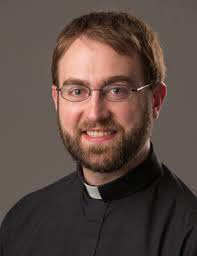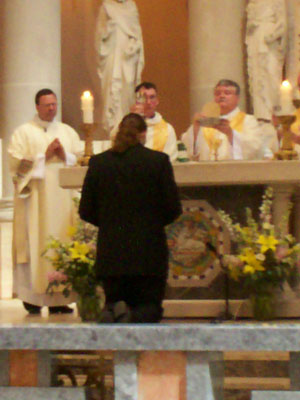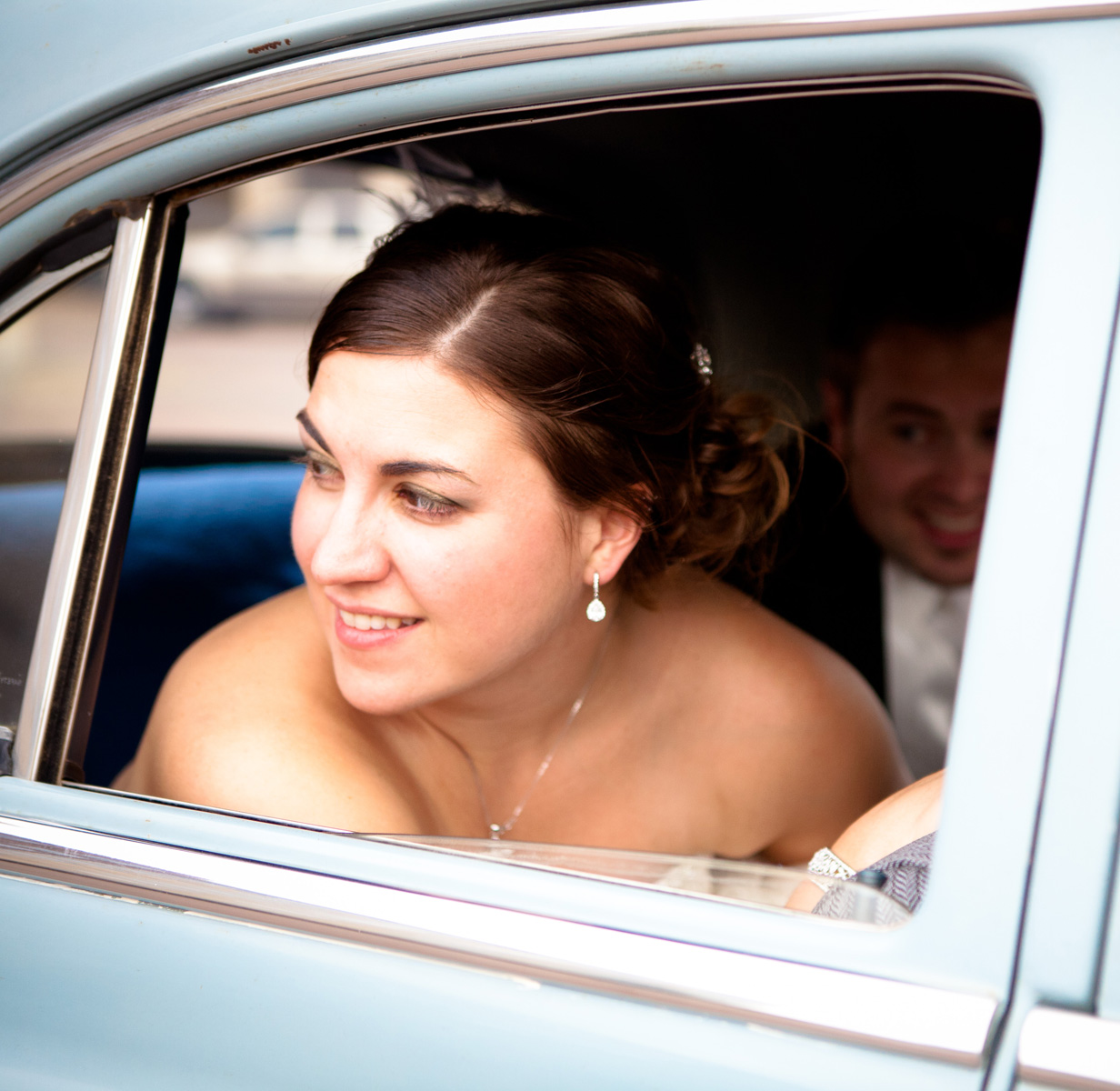
Our first blog interview guest is Jacob Boddicker, SJ. Jacob is a Jesuit Seminarian who is in his ninth year of seminary. He is currently pursuing his Masters of Divinity at the Jesuit School of Theology in Berkeley at Santa Clara University. He was born and raised in Eastern Iowa.
When did you first feel called to Holy Orders?
When I was in middle school, maybe around 7th or 8th grade, I was folding laundry at the dining room table. A cousin of mine named Eric had just returned from hunting turkeys with my dad. He stood in the doorway of the kitchen sipping on a beer, watching me fold laundry, and he said, “Jacob, you have the right attitude to be a priest.” I didn’t think anything of it; I wanted to be a father and a husband and being a priest wasn’t even on my mind. So I basically laughed it off.
Fast-forward to my third year of college. I was at the University of Northern Iowa after having transferred from the University of Wyoming. While at UW I had, through the Newman Center, come to embrace my Catholic faith. I wouldn’t have called myself a religious person—I had no prayer life and I wouldn’t say I really connected with God at the Mass, for example—but being Catholic was certainly part of who I was, and weekly Mass was a non-negotiable for me. At UNI I continued this, and after a few months of being at a new school three important things happened:
- I was studying secondary education and history, thinking I’d be a social studies or history teacher in a high school. Realizing I didn’t have a vocation to teaching, I dropped that part of my major.
- My girlfriend of a year-and-a-half broke up with me. She was my first girlfriend, and I was beginning to think that she was the one I’d end up being with for life.
- I was not satisfied with studying history and could not see what I would do with a degree in it.
In this time of crisis I realized that I honestly had no idea what to do with my life and more panic-inducing was the fact that not a single human being alive knew what I should do with my life either. By the sheer grace of God I realized only He knew what I should do with my life, since He put me here, and so I decided I should ask Him. I also realized that meant praying, something I did not know how to do. I knew, though, that the rosary was a powerful prayer and I had a rosary, though I didn’t know how to “use” it. I knew, though, which beads were Our Fathers and which were Hail Marys, so in every spare moment I had I was praying those prayers on the rosary, asking God for comfort and guidance. After a few weeks of this I had a powerful experience of God’s presence that was frightening (since I’d never had such an experience before) but convinced me that He was listening and that I was on the right track.
Why did you choose to join the Jesuits specifically?
A month after that experience I was at an RCIA meeting, having been asked to sponsor a candidate at that time (frankly, I benefited as much as he did, learning about my faith!). At the first meeting I attended, a history professor from the school came and gave a one-hour lecture on the history of the Catholic Church. When one considers all that could be talked about from our 2,000 year history, and then one considers what ought to be focused on in one hour’s time, there are a lot of great things that will have to be left aside. However, he somehow saw fit to mention these men called “Jesuits” of which I had never before heard. He only mentioned them, barely, perhaps a sentence or two. But when he did I felt something in my heart move and I knew I needed to find out more about these guys. I found a vocations brochure in the church and read about them, and I stayed up late looking up information online. I even sent an email to the vocations director asking for “anything free” about the Jesuits.
Before going to sleep I was praying my rosary, as I was accustomed by that point, and asking God if this is what He wants me to do with my life. In the midst of that prayer I had another powerful experience of God’s presence and I knew, deep in my heart, He was saying, “Yes, go down this road and I will tell you if and when I want you to turn from it.” So when people ask me why I chose the Jesuits, I tell them honestly that I did not. I chose what I sincerely believed God was asking of me, and it happened to be this Order. As I read more about the Order and especially about her saints—St. Ignatius, St. Isaac Jogues, Bl. Miguel Pro, etc.—I became very excited at the prospect of entering into a lineage that included such amazing men of God. But also at the time I was very much in love with a young lady who fit every hope I’d had in a future wife and mother of my children, so without God’s explicit action in my life, I don’t know that I’d have chosen the Jesuits myself. But in the years since I have come to see that this is indeed the life I’d always wanted, and I’ve never once regretted my choice or called it into doubt. These last ten years have been the very best of my life, even if they have also in ways been the most challenging.

What about your childhood shaped and lead to your call to a religious vocation?
Growing up in a large family was huge. I learned how to live in community, to share a space and belongings with other people, to relate to others, all of which has prepared me for relationships with all manner of people and for the community life which is necessary to living in a religious order. I would also say that growing up in the countryside played an important role in my spiritual life, as it taught me to pay attention to how God works in the world. I was always sensitive to the changing of seasons, to the things that little bugs and other creatures were doing in the world, to the sounds water made in the creek, to the way the wind whispered differently according to the kind of tree it was blowing through, etc. Growing up surrounded by God’s creation gave me a heart sensitive to the subtle, to the beautiful and it has strongly influenced my spirituality and instilled in me early on a deep appreciation for beauty. Finally, music was a near-constant in my life as a child, primarily through my father who was always playing tunes on the piano but also my mother who was often listening to different kinds of music on the stereo. All of us children were in the band or choir, and at a young age music played a very important role in my emotional and budding spiritual life. I turned to music in times of angst or heartache, and later in my Jesuit life music would play an important part in my ministry and prayer life.
How can parents, especially mothers, cultivate and encourage religious vocations in their children?
The most important thing is to talk about it. I cannot recall my parents ever talking about the possibility of myself or any of my siblings becoming a priest or religious. Had not my cousin—himself a convert to the faith—mentioned anything, I don’t know how that seed would have been planted otherwise. When through prayer I felt God was calling me to the priesthood, it made no sense to me whatsoever until I remembered my cousin’s comment those years before. Then through the lens of that memory all manner of things in my past life began to make a great deal of sense if I considered them as stepping stones toward a priestly vocation.
I believe it is important for parents to ponder and pray over, from time to time, the promises they make at their child’s baptism and to realize that in baptizing their child they are consecrated him or her to God, giving them up to their heavenly Father. He entrusts His newborn child back to the parents, as He entrusted His Son to St. Joseph, but that child belongs to Him and one day it may be that this child feels called to be about their Father’s work. Too often I meet parents who lament the shortage of priests and sisters, but when asked if they have ever spoken with their children about a vocation the answer is something like, “What? Oh no, not my child.”
Finally, parents must be true to the promise they made at their child’s baptism to raise their children in the faith and teach them to know and love God. Foster positive relationships with priests and religious and expose children to the beauty and goodness of the Catholic faith. It is so important for children and young people to see priests and religious who are joyful because if a child can see it, a child can imagine it and might, perhaps, imagine themselves being a priest or religious.
As for mothers, I would say that in addition to these things they have a special vocation to prayer for their children. This is not to let fathers off the hook—not at all!—but I have long had a sense that there is a particular dimension of depth to the spiritual relationship a mother has with her children that is different for the father. I think of the example of Mary holding so much in her heart regarding her Son’s life, and how she must have prayed for Him every step of the way from the cradle to the cross. Let your children see your own prayer and devotion, and foster in them a space in their life and their heart for God.
How can lay people and parishes foster a community that cultivates religious vocations?
Lay people and parishes can do much of what I’ve mentioned here, especially talking about vocations to begin with. It must be more, though, than having brochures lying around or hanging up posters. Have a Sunday every year dedicated to raising awareness about vocations. Invite religious to the church to talk to youth and confirmation groups about religious life and their own vocation story. Do all that is possible to keep young people involved in the life of the parish and let them know how valuable they are. Lay people especially can be powerful instruments of grace: if you meet a young person and have a sense that they would make a good priest or religious, don’t be afraid to tell them. You have no idea how crucial the seemingly random comment of a stranger might be further on down the road of life.
For those who feel they may be called to a religious vocation, what first steps do you recommend they take as they begin discernment?
Whether a person feels called or not I believe it is part of our baptism to at least consider it seriously. Our vocation, whatever it might be, is simply the response to God’s call to love Him with all our heart, soul, mind and strength. When we go to receive Jesus in the Eucharist we see the Host held out before us: the naked, vulnerable Jesus offering His whole self to us. Love demands a response, does it not? There is the call: Jesus gives His whole self to us out of love for us, and so our vocation is however we discern to give ourselves in response to His initial gift.
The first step in discernment, I would say, is to pray. Take time each day to be quiet with God and with your thoughts and speak to Him about what is going on in your heart and soul. As things become a little more refined, a little clearer, it is important to seek the help of a spiritual director, or a priest/religious to whom you can go to talk these things out. Discernment retreats can also be powerful tools of discernment and give a person an experience of religious life that can be the matter of further reflection. The Dominican Sisters of Mary, Mother of the Eucharist offer a discernment retreat for women two or three times a year that many find extremely helpful. Many religious orders have “Come and See” weekends for those in discernment as well.
Ultimately it is important to remind yourself that Jesus just wants you, period. He gives Himself for you, not for what you’ll do for Him. Ours is not a God of destiny or fate, such that He has in mind for you a single destiny that you must figure out and if you go a different way, you’ll be miserable. Discern and decide how you desire to give your life to God out of love for Him and trust that He will bless it. Don’t try and figure out what would make Him happier; He already loves you. Don’t try and figure out what would be “best”; the primary vocations of generous single life, marriage and consecrated life/priesthood are all incredibly good. Choose how you wish to give your whole life to God as He has given His whole life to you, and then trust that this pleases Him greatly. Do not be afraid.
What resources, people, and/or advice helped you in the discernment process?
The first help was the priest at the student center I attended while discerning. My conversations with him were very helpful. Having a spiritual director and regular conversations with the vocations director of the Order were also helpful. There were two bits of advice I remember in particular that put a lot of my anxieties to rest. I was torn between being a father and husband versus being a priest, and the priest at the student center once told me, “Jacob, the Church needs good, holy marriages just as badly as she needs good, holy priests. Where do you think priests come from?” This helped me to see that both vocations were important to the Church, and I ought not become a priest simply because it is somehow better or more important than getting married. It is about serving and loving God, first and foremost, whatever vocation one chooses. The vocations director of the Order told me something along the same lines as the other priest: “Jacob, we wouldn’t want you if we didn’t think you’d also be a good father and husband.” This helped me to see that the two vocations of marriage and priesthood are not as mutually exclusive as I once believed and that my desire to be a father and a husband would serve me well as a priest. Finally, weekly Mass (or more frequently, if possible) and regular confession are vital; drawing closer to Christ in the sacraments can only help in acquainting ones heart even better with the one to whom you wish to give it.



Comments
RSS feed for comments to this post